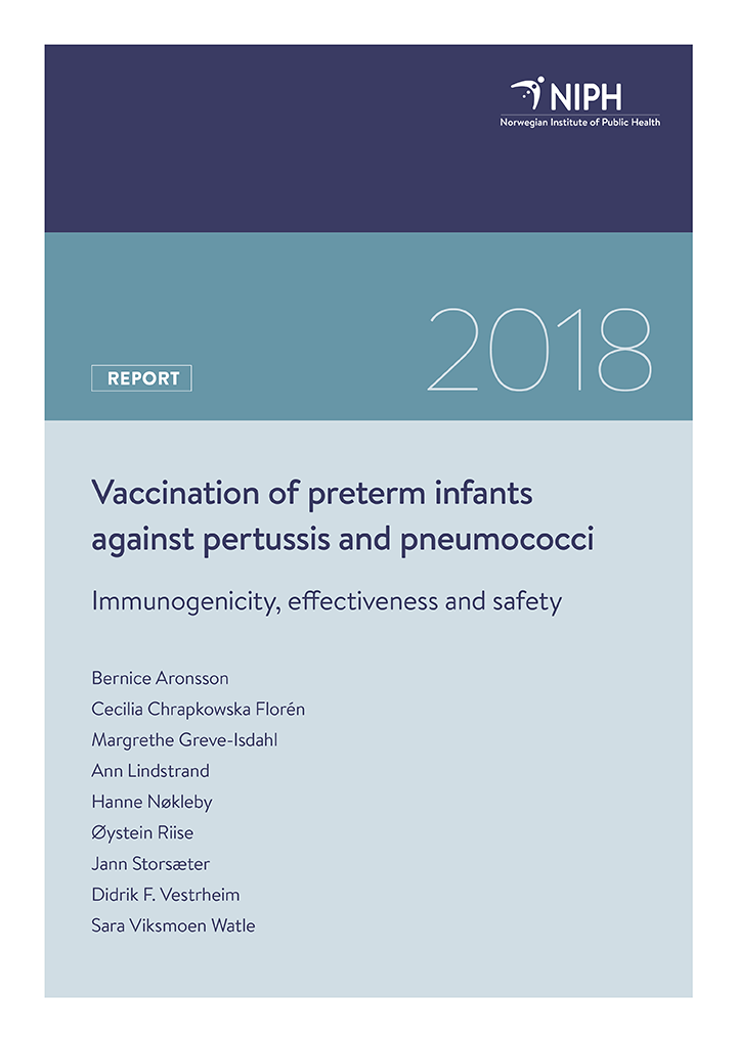Vaccination of premature infants against pertussis and pneumococci
Rapport
|Publisert
For tidlig fødte barn har økt risiko for alvorlige infeksjoner i spedbarnsalder sammenlignet med fullbårne barn. Denne rapporten oppsummerer dagens kunnskap om immunogenisitet, effekt og sikkerhet ved vaksinasjon av for tidlig fødte barn mot kikhoste og alvorlig pneumokokksykdom. Resultatene støtter oppstart av vaksinasjon ved 8 ukers kronologisk alder, spesielt med tanke på beskyttelse mot kikhoste. Spedbarn født før 30 ukers gestasjonsalder og spedbarn med betydelig samsykelighet bør overvåkes minst 48 timer etter første vaksinasjon, og bør helst vaksineres før utskrivelse fra sykehuset. Rapporten vil danne grunnlag for oppdaterte anbefalinger for vaksinasjon av for tidlig fødte barn.
Sammendrag
Sammendraget finnes kun på engelsk:
Executive summary
Introduction
Preterm infants are more vulnerable than full-term infants to certain infectious diseases, including vaccine preventable diseases like whooping cough and invasive pneumococcal disease. The aim of this literature review was to provide data on the effect and safety of vaccinating preterm infants against these two diseases as a knowledge base for a recommendation on immunization of preterm infants in Norway and Sweden.
Methods
We conducted a rapid, systematic literature review of studies on immunogenicity, effectiveness and safety of vaccines against whooping cough and invasive pneumococcal disease in premature infants. Articles published between 1986 and June 2017 were included.
Results
Antibody levels against pertussis toxin and pertactin achieved in premature infants were similar to that of full-term infants both with the use of different aP-containing combination vaccines and various vaccination schedules. Pneumococcal conjugate vaccines used with various vaccination schedules are immunogenic in preterm infants, and most preterm infants develop levels above putatively protective level for the majority of serotypes included in the vaccines.
The vaccine effectiveness against whooping cough in preterm infants was found to be 45–71 % after the first dose and 89–90 % after the third dose recommended at 12 months of age in the two studies included. The vaccine efficacy of PCV7 against invasive pneumococcal disease with vaccine serotypes was found to be 100 % in preterm infants.
Apnea/ABD events in the 48-72 h post-vaccination period was described in 8 included studies for 0-23% of children born prematurely. There was a clear tendency of lower incidence of apnea/ABD events with higher GA at birth. There was no correlation between the chronologic age of the infants at first vaccination and the incidence of post-vaccination apnea/ABD events. Preterm infants, who have had sepsis and those with lung disease, had an increased risk for apnea/ABD events post-vaccination compared with preterm infants without these co-morbidities. A causal relationship between vaccination and death was not found in any study. There may be a risk for recurrent apnea after the second dose if the infants had serious apnea after the first dose. Prospective studies are needed to make any conclusions if there is an increased risk of apnea/ABD events when multiple vaccines, especially conjugated vaccines, are given concurrently.
Conclusion
As the benefit of vaccination is high in preterm infants, vaccination should not be withheld or delayed. The first dose should be given starting at approximately 8 weeks of chronological age, especially with regards to protection against whooping cough. Infants born before 30+0 weeks of gestation and infants with significant comorbidity should be monitored during the first vaccination for at least 48 h, and should preferably be vaccinated before discharge from the hospital.


